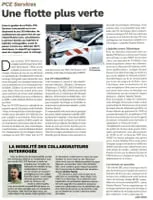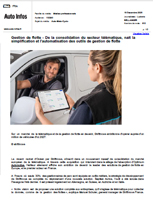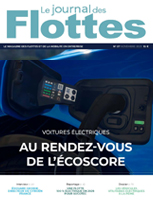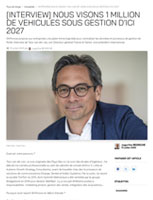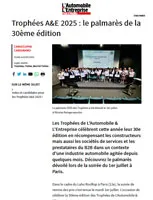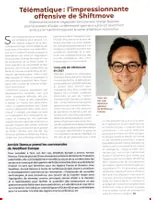PCE Services
Car Fleets, November 2023 — Julie Vénier
A progressive electrification policy
In addition to the daily management of its fleet, PCE Services has initiated a greening process for its 303 vehicles. This transition is mainly based on electrification, with priority currently being given to hybrid and plug-in hybrid vehicles (PHEV), before a future transition to 100% electric vehicles.
Initially, the fleet consisted of only two electric vehicles. “We wanted to promote this technology, in particular because one of our divisions specializes in the installation of charging stations,” explains Damien Fauriat, fleet manager at PCE Services.
To guide this approach, an external consultant was appointed to inform the company about the Mobility Orientation Act (LOM) and the need to green the fleet. Under his advice, PCE Services revised its fleet management policy to comply with it.
Towards an electrified VP fleet
With regard to passenger vehicles (VP), PCE Services has decided to only offer electric or hybrid vehicles. After an in-depth study to select the most suitable models, tenders were launched with rental suppliers.
Since April 2022, all the VPs offered are either 100% electric, or hybrid or plug-in hybrids. The current distribution of the fleet is as follows:
- 226 diesel vehicles
- 14 gasoline-powered vehicles
- 28 hybrids
- 17 plug-in hybrids (PHEV)
- 17 electric
In 2022, 64 vehicles were renewed, including 21 diesel (mainly Renault Master vans), 15 electric and 28 hybrids.
“Diesels are still mainly used for commercial vehicles, because electric or hybrid vehicles are not yet fully adapted to certain uses,” explains Damien Fauriat.
Low emission zones: a major challenge
With twelve depots spread all over France, needs vary according to geographic areas. While some rural sites are not yet impacted, depots located in urban areas, such as in Les Ulis (91) or Grand-Quevilly near Rouen, must anticipate restrictions related to low-emission mobility zones (ZFe-m).
“We are in discussions to introduce more compact electric commercial vehicles, such as the Kangoo Z.E.”, explains Damien Fauriat.
For service and executive vehicles (RVs), a complete transition to electric vehicles is envisaged.
Employee mobility and CSR
As part of its corporate social responsibility (CSR) policy, PCE Services conducted a survey among its employees in order to better understand their commuting habits (carpooling, public transport, personal vehicle, etc.).
This study led to the examination of a shared bicycle project with a service provider, but the high costs in rural areas hampered its implementation. This subject is still being studied, in particular to facilitate travel during lunch breaks.
The CSR committee has also established the possibility of one day of teleworking per week.
In addition, a fleet of six carsharing vehicles has been created (two diesel, three PHEV and one electric). These vehicles are reserved via an application developed by Optimum Automotive and intended for employees who do not have a company vehicle but need to travel for professional reasons.
Charging infrastructures under development
The PCE Services headquarters, located in Parigny (42) in a rural area, has 18 charging stations, each with two charging points offering a power of 11 kW in alternating current (AC). These terminals are manufactured by Keba.
In addition, six terminals accessible to the public are installed on site: four Ingeteam (22 kW AC) and two DBT (50 kW), managed by the company Mobility.
PCE Services plans to gradually equip its other depots with at least one to two terminals, with two charging points per station.
The company's energy division oversees the deployment of this network.
Uses and constraints
On the human resources side, no decision has yet been taken concerning the installation of terminals at home for employees. The sites will be equipped with terminals, and employees have charging cards (RFID badge) compatible with the national DKV network.
However, Damien Fauriat points out that “charging is a waste of time and that fast charging stations remain more expensive.”
Julie Vénier


